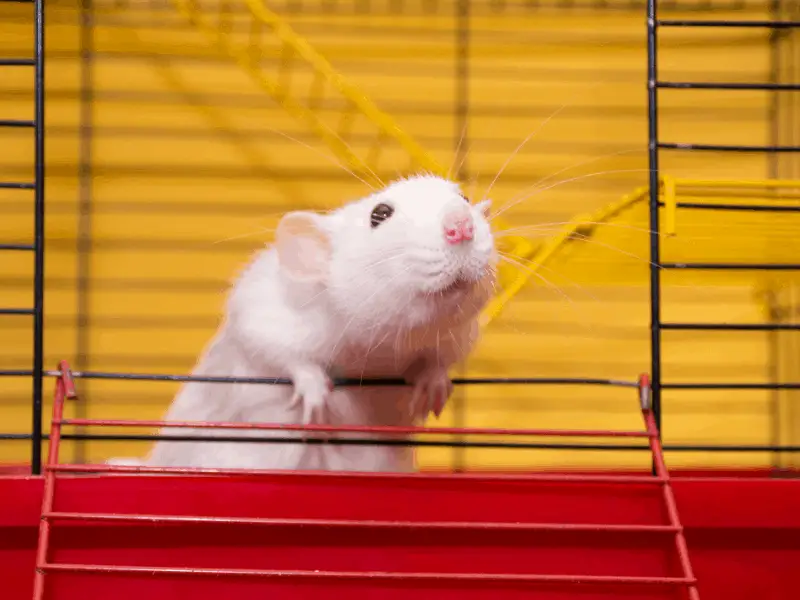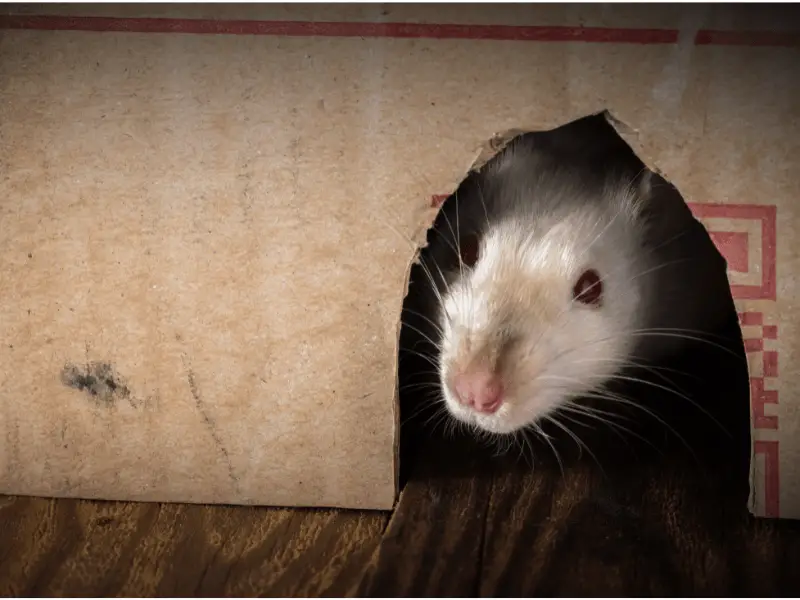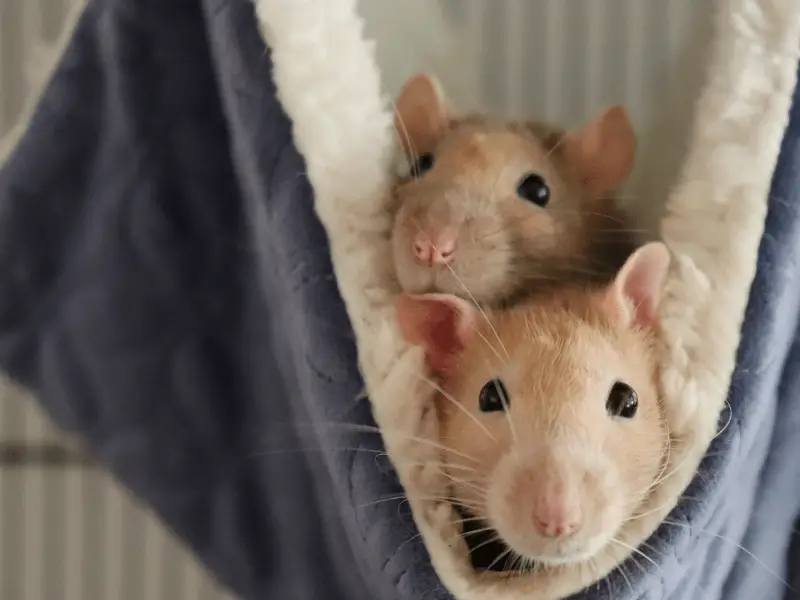This article contains affiliate links, and we may earn a commission at no cost to you if you choose to purchase through these links. I never recommend products that I do not trust or will not advise my veterinary clients and patients to use.
If you are charmed by fancy rats’ cuteness and consider getting them as pets, don’t let the common myth that pet rats will stink up your house deter you. While this certainly is true in some cases, it does not have to be the norm.
Pet Rats are fastidiously clean animals. Fancy rats have a pleasant light body odor that is sometimes described as soft and musky. The unpleasant smell that most people associate with pet rats is ammonia from urine or the scent of their droppings. Good husbandry practices can effectively avoid these unwanted scents.
There are many ways to prevent any unwanted smells from your rats. Most of them are very easy to implement and maintain. Let’s look at some of the reasons rats might not smell like a rose garden and ways to mitigate any unwanted odors.

What Do Rats Smell Like?
Grape soda with a hint of corn chips? This is how some rat owners would describe it, but I’m not entirely sold on that description. Rats have a faint scent that most people will actually describe as a pleasant smell.
Some people tend to be more sensitive to certain scents than others. For example, for the non-dog owner, the smell of wet dogs may be unbearable. But, for example, I barely consciously notice the smell of damp dogs anymore after years of working with dogs every day. This is precisely the same for rats. After spending many hours with your pet rats, you may no longer notice their faint scent.
Bad smells are not normal for rats, so this should never be a smell that a pet rat owner should get used to.
Urine Marking- The Most Common Cause of The Smell
Both male and female rats have scent glands on different areas all over their bodies, including the bottoms of their feet. The scent emitted from these glands is far too faint to be picked up by a human nose and is used in the wild to communicate important information such as age, gender, and stress level.
Rats also commonly use urine to scent-mark, and this is probably what most people think of when talking about rats marking their environment. Both males and females display this behavior, but males and especially intact males participate in this act much more frequently than females or neutered males.
Females will commonly increase the frequency of urine marking shortly before ovulating as a means to advertise their sexual availability. Spaying (removing the uterus and ovaries) eliminates urine marking in females.
In male rats, urine marking is associated with testosterone levels. Uncastrated male rats will mark at a higher frequency around puberty, and dominant males will mark at a higher frequency in general. Castration or neutering reduces the marking frequency by at least 20% of the pre-castration frequency. Honestly, I can not recommend neutering enough.
Male rat urine has a much more pungent odor compared to female rats, much like a male cat’s urine smelling far worse than a female cat’s urine.
You can read more about urine marking in this article on how to stop your pet rat from peeing on you.
How to Prevent Your Pet Rats from Smelling
Keep Only a Few Rats
Of course, 30 rats will stink much more than three rats, but this may be due to more factors than simply the number of rats present.
Rat owners who keep multiple groups of rats that share, for example, a common free-roaming area where each group of rats gets a turn to use the space will see an increase in urine marking behavior. The scent of unfamiliar rats will cause increased marking frequency as one group of rats will attempt to claim the play area as their own.
The smell of rat urine will also be far less noticeable if only three rats are kept in a large, well-ventilated room versus multiple groups of rats in a basement. This is due to the sheer volume of urine and feces produced by a larger number of rats (and poor ventilation in the case of them being kept in the basement).
Litter Train Your Rats
Rats catch on to using a litter tray surprisingly fast, and it makes cleaning all the stinky stuff on a daily basis much easier if it is all in one spot.
You can use a small, shallow tray with cat litter box sand in it. Alternatively, there are small litter trays available on Amazon that you can conveniently attach to the side of their cage.
When introducing your rats to a litter tray for the first time, please place it in an area in the cage away from their food, preferably an area they already used as their toilet, and put a few droppings inside the tray. This will help them get a hint of what the tray is for.
A vet friend of mine also suggested placing a smooth river rock in the litter tray. This acts as the ‘pee rock’ and encourages them to urinate in the tray as well. They love to urinate on or against a smooth rock surface for some inexplicable reason. Give it a try!
For the first while after introducing a litter tray, you will probably still need to do some cleaning up after them as they catch on to the new toilet area. After that, you can just pick up any stray poops and place them in the litter tray every now and then.
This will eventually make removing all the smelly stuff much easier as you can give the letter tray a quick clean once a day, but do not throw out all the litter every day. Rather just scoop out the litter that came into contact with urine or feces as you do not want the litter tray to smell entirely novel for them after cleaning. Plus the cost of litter will add up. It is much more economical to just remove the soiled pieces of litter.
Also, avoid scented litter. Rats’ sense of smell is extremely sensitive and they do not appreciate scented objects the same way we do.
Unfortunately, most rats will still leave the occasional poop outside the litter box, but the frequency is often drastically reduced at the very least so I will still rat this very highly as a strategy to minimize rat cage odor.
Use The Right Bedding And Toys
Toys and bedding can be another culprit in the smells department. Cardboard and paper become quickly soaked with urine and food material and hold onto bad smells. I do not advise using paper shreds as bedding for your rats as it will quickly become soggy and seems to amplify any bad smell it comes into contact with.
I sometimes offer a toilet paper roll or cardboard boxes as toys for my rats to play with but find that they seldom make it past the 48-hour mark before becoming gunky. Remove or replace these often.
Bedding is extremely important in terms of the rat’s respiratory health as well. The build-up of ammonia in a rat’s environment is one of the most important causes of respiratory disease in pet rats and also one of the reasons why pet rat cages should always be well ventilated and why you should never keep your pet rats in terrariums or glass cages.
Some rat owners prefer using materials such as felt or fleece to cover the bottom of the cage, and while it is nice and soft to the touch, it does not absorb smells very well. If you choose to go this route, I would advise changing it daily. Luckily, these materials are easily machine washable. Just remember to use fragrance-free, mild detergents.
Wood-based beddings such as kiln-dried pine work very well as it helps to reduce ammonia and helps to absorb bad smells to a certain extent. This type of bedding seems to work the best in odor control over a more extended period but still needs changing out at least once a week.
Avoid toys that can not be washed such as wooden nesting boxes. Toys and ladders made of fabric or rope that can be thrown in the wash are ideal. You can even add a cup of vinegar to your rat washing to help break down unwanted odors. Don’t worry, the vinegar scent does not linger and it is very effective to break down unpleasant odors.

Spot Clean Daily and Deep Clean Only Once Every Other Week
Cleaning too much and too often can cause an increase in urine marking as their cage no longer smells like home. Rats like their homes to smell like them, and therefore keeping familiar smelling items around can significantly reduce the amount of urine marking.
Instead, take 10 minutes a day to remove soiled bedding or toys and replace one or two of the hammocks. Having a selection of toys and hammocks that you can clean on a rotational basis will help keep the cage smelling fresh without increasing their desire to urine mark everything when nothing smells familiar.
Clean out the food and water bowls on a daily basis and remove uneaten food. Food left standing can also be a culprit for the foul odor that many owners might overlook.
When doing a deep-clean, scrub everything! The smell of urine can easily get trapped in the small nooks and crannies of the cage, even between the cage’s wiring or in the cage door’s hinges. Use a mild detergent. I have friends who swear by using their aunt’s vinegar and baking soda solution and that’s great! It’s gentle and fragrance-free which ticks all the critical boxes. I use Nature’s Miracle Cage Cleaner conveniently available on Amazon. It deodorizes and cleans without irritating my rat’s sensitive respiratory tracts.
Let the cage dry properly before replacing the bedding and toys. Also, clean around the area where the cage stands. Finally, scrub the floors and walls as you will be surprised how talented your rats may be at urinating outside their cage.
Check Your Rats for Health Conditions
Certain health conditions such as teeth problems or respiratory diseases can also cause your rats to smell. Make sure to take your rat for a check-up at least once a year, but don’t wait for the yearly check-up if you suspect that something might be wrong with your rat.
If you notice abnormal stools, it could indicate gastrointestinal upset or infection. Runny or abnormal stool often smells much worse. Ensure your rats eat a well-balanced rat-specific diet and get them checked out for internal parasites such as giardia if you notice abnormal stool.
Remember, with many diseases in rats, the sooner we catch it and start treatment, the better the prognosis. Please don’t wait because you might think that the symptoms will spontaneously resolve. You are the voice of your pet rat because they can’t tell us if something is wrong. So if anything seems off, get it checked out by your vet!

Don’t Bathe Your Rat Unless They Struggle to Groom
Rats are generally very good at keeping themselves clean. My rats even love scrubbing their paws and faces when I provide them with a small swimming pool in the summer months. They, unfortunately, do not appreciate a bubble bath the way we do, so I generally do not advise rat owners to bathe their rats unless it is absolutely necessary.
The exception to this is rats that are old or sick and unable to groom themselves adequately. In this case, use a small amount of fragrance-free puppy shampoo in lukewarm water and make sure to properly rinse afterward and dry them with an absorbent towel.
This should not be done more than once per week as it can be extremely drying to their delicate skin and can lead to skin irritation and itchiness.
Don’t Add Anything to Their Water
Somewhere on the internet people are telling rat owners to add vinegar or lemon juice and other strange concoctions to their pet rat’s water in order to reduce the smell of their urine. This does not work! Don’t fall for it! The only thing that you will achieve by doing this is potentially putting your rats off their water and causing dehydration.
Conclusion
Pet rats don’t have to smell bad! There are many ways to prevent unwanted smells from hanging around your pet rats. If you think they smell bad once you smell them, just imagine how bad it must be for them with their extremely sensitive noses.
Simple daily habits can prevent bad smells. It does not have to be a massive cleaning mission every week. Just 10 minutes of basic housekeeping every day and a deep-clean scrub every other week can effectively keep your pet rat odor neutral. This should keep even the most particular of human noses finding their way to your pet rat cage, happy and frown-free.
References
- Brown, R., 1977. Odor preference and urine-marking scales in male and female rats: Effects of gonadectomy and sexual experience on responses to conspecific odors. Journal of Comparative and Physiological Psychology, 91(5), pp.1190-1206. https://psycnet.apa.org/record/1978-11772-001
- Laing, D., Panhuber, H. and Slotnick, B., 1989. Odor masking in the rat. Physiology & behavior, 45(4), pp.689-694. https://www.sciencedirect.com/science/article/abs/pii/0031938489902801
- Price, E., 1975. Hormonal control of urine-marking in wild and domestic Norway rats. Hormones and behavior, 6(4), pp.393-397. https://www.sciencedirect.com/science/article/abs/pii/0018506X75900069

